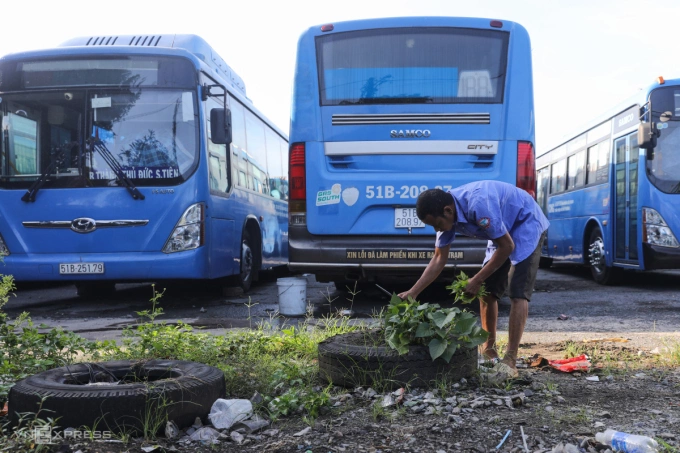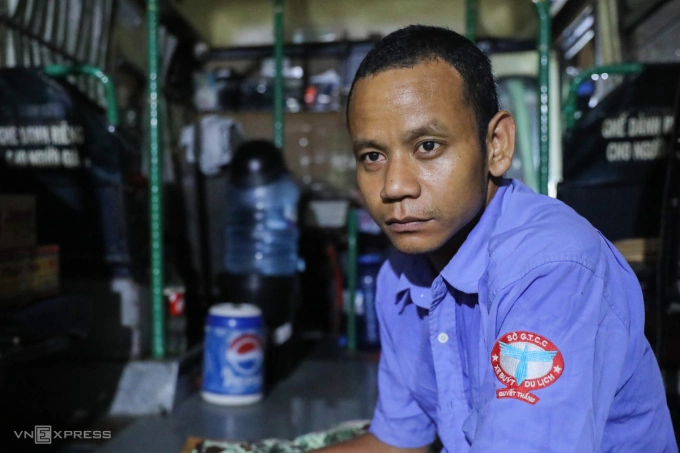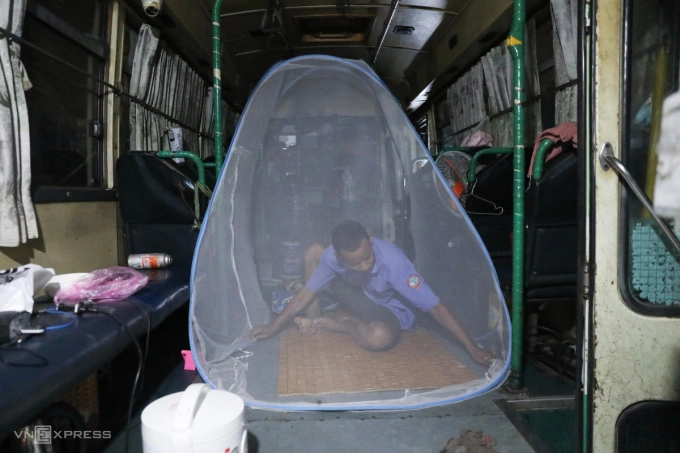Covid forces HCMC conductors to sleep in buses
After months of unemployment following HCMC’s suspension of transport services, many out-of-pocket conductors have taken to sleeping on the bus.
 |
|
Many bus attendants working for Vietnam National University-Ho Chi Minh City (VNUHCM) in Thu Duc City lost their jobs at the end of June when the city stopped bus services to curb the spread of Covid.
Mai Thai Cuong, a 52-year-old from Hanoi, has been living inside a bus since he doesn't have enough money to rent accommodation or return to his hometown. Life in the rural area is difficult, so he moved to the southern metropolis to work as a bus conductor two years ago.
"I thought the Covid resurgence in late April would be stamped out after one month and didn't expect bus services to shut down this long. In the past few months, my colleagues and I have been trying to hold out in these buses," he said.
|
 |
|
Since Cuong lives alone, he only has a few clothes, a mini gas stove, a sleeping mat and a few jugs of water.
He collects rainwater for daily use or purchases some to drink. When there isn’t enough water, he would bathe once every two days.
"Instant noodles and eggs are the dishes I eat the most to help me stay afloat during the month-long lockdown. Now I've gotten tired of eating those. Thankfully, I now have more options to choose from as the city allows takeaway services," he said.
|
 |
|
In the past four days, Cuong and three other bus conductors got jobs as construction workers at a site four kilometers from the bus station.
While waiting for the bus service to resume operation, Cuong said he would take on any seasonal job to earn a living.
|
 |
|
At 5:30 p.m., after returning home from work, Cuong cleans his "house", bus number 53, which usually runs from VNUHCM to Hong Phong Street in District 10.
"I've been hiding from my family that my life here is still fine. My family in the countryside is also poor. Now I am unemployed, I am very sad that I can't send money home to my children," he lamented.
|
 |
|
Similar to Cuong, after work, Thach Cham Pha took advantage of his free time to plant some vegetables to incorporate into his meals.
The 37-year-old of Khmer origin moved from southern Tra Vinh Province to Ho Chi Minh City to earn a living more than 15 years ago. For the first two years, he has done many construction jobs to survive.
"I have a heart condition and can't do heavy work, so I switched to working on a bus. My monthly salary is around VND6 million ($264.34), which is not enough to rent accommodation. So I've been on the bus since before the Covid outbreak broke out," he said.
|
 |
|
Pha's dinner mainly comprises fried leftovers from noon. On the bus, he has installed a rice cooker, fans and blankets.
During the social distancing period, a few other conductors pooled money to buy food, making use of the corner of Pha's kitchen to cook together. They asked a neighbor living near the bus station to let them store food and produce in their refrigerator.
|
 |
|
After finishing dinner, he takes a shower and washes his clothes at 6:30 p.m.
He pays a household next to the bus station VND50,000 a month to use their water, which he puts in buckets and carries back to use for bathing and washing, and VND100,000 per month to share their electricity bill.
To cook and drink, he has to collect rainwater or buy bottled water.
|
 |
|
"Every day, I only dare to spend about VND50,000. I also have to save money to buy medicine. In the past few months, I have been supported with some food by donors.
"If bus services won't resume operation soon, I don't think I could hold out much longer with such little savings left," he said.
|
 |
|
Opposite to Pha's bus is the "home" of Tran Phu Quy and his son.
Two weeks ago, he picked up his youngest four-year-old from Long Thanh District, Dong Nai Province, to feel less lonely.
Quy has two children, the oldest is 12 and lives in the countryside with his grandparents in Dong Thap Province. His wife works at a factory in Dong Nai and raises the youngest child. Due to the nature of their work, Quy and his wife have to stay far from each other.
In the evening, he often hangs out in a hammock with his son to watch something on the phone together or call his wife.
The cooking is done in Pha's kitchen.
"My son likes to live in the bus station because he can run around everywhere. So he doesn't want to go home. During the five years of doing this job, I have never thought I would be living and sleeping in a bus one day. But I'm used to it now," the 41-year-old confirmed.
|
 |
|
Since the inside of the bus is stuffy, conductors often go to the park nearby to relax or go for a walk.
When night falls, they often sit and drink tea and chat around a homemade wheeled table.
|
 |
|
"Life here is very boring. If it rains, I will go to sleep early at 9 p.m.," Pha said.
"This bus is old and can't close all its doors all the way, so mosquitoes come in a lot, meaning I have to sleep under a net."
|
 |
|
Quy sleeps on the floor and lets his son sleep on the hammock. Since his bus is new, the doors can fully close so there is no need for a net.
He hopes bus services would be allowed to operate again soon and be as crowded as before in order for him to have money to pay a debt of VND20 million.
Nguyen Vinh Tung, manager of the bus station of VNUHCM, said there are about 80 buses parked here and nearly 50 drivers and conductors staying here due to the epidemic. Most of the stranded people rent a motel room near the bus station, while more than 10 people are allowed to stay on the bus due to poor circumstances.
"Recently, the bus station also gave each driver and conductor VND1 million. Some also received additional state relief packages and food support," Tung said.
From Oct. 4, Ho Chi Minh City reopened four bus routes operating in Can Gio District. On Oct. 25, another four routes would be allowed to resume service, with frequency and operating time depending on the situation and actual needs of each area.
|











